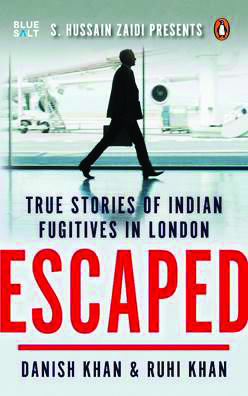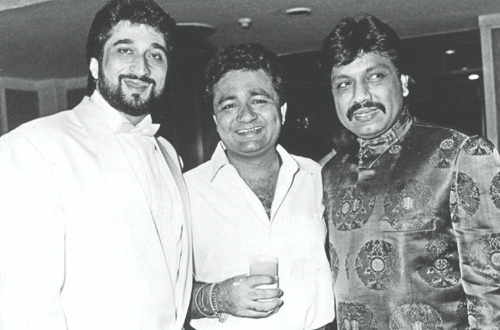"Escaped : True Stories of Indian Fugitives in London" | Musicians of Mayhem
Escaped delves into twelve extraordinary cases of extradition over seven decades to unravel the legal quagmire that has caused much debate in Her Majesty’s courts, and consternation in New Delhi’s corridors of power; Excerpts:
Author: Danish Khan and Ruhi Khan
Publisher: Penguin
The rift between Nadeem and Gulshan was no secret. The cassette king and the reigning musical czars could not take their collaboration ahead. It was perhaps the success of Aashiqui that had made the professional road bumpy for them. But was it that bad, that instead of going their different ways, a Bollywood heavyweight gave out a supari?
On 12 August 1997, when Gulshan Kumar came out from a Shiv temple in Andheri, he was attacked by armed assailants. Gulshan was shot in his arm and waist. He managed to duck into a public urinal to seek refuge, but was followed by the killers. He then ran towards a nearby shanty and pleaded with an old woman to let him in and close the door. The shooters followed him and shot volleys of bullets, ending his life. According to author S. Hussain Zaidi, gangster Abu Salem had instructed his men to call him from their mobile at the time of the firing so that he could hear Gulshan wailing!

Just a week before, an attempt had been made on the life of Gupt producer Rajiv Rai. Gulshan Kumar’s murder was the pinnacle of shock that the underworld inflicted on the psyche of Bollywood. This audacious murder had put into oblivion all the threatening calls and the visits to Dubai—voluntarily and involuntarily—by Bollywood stars. The Mumbai Police were in disarray. This was a direct challenge thrown at them, putting them under intense pressure to show results.
After the necessary formalities, Gulshan’s body was taken to Delhi for cremation. The employees from his several companies constituted the majority of those present (one estimate pegged the number at 10,000) for the last journey from Gulshan’s Greater Kailash residence to Nigambodh Ghat. The crowd following Gulshan Kumar’s body was chanting Jai Mata Di and Gulshan Kumar Amar Rahen and also Mumbai Police hai hai. Gulshan Kumar’s mortal remains were on a truck that was laden with flowers.
The police were already facing the music with the killings of trade union leader Datta Samant, mill owner Vallabhbhai Thakkar, and the attacks on Subhash Ghai and Rajiv Rai. Gulshan’s murder was the proverbial last straw that triggered the inevitable change in guard of one of the most powerful posts in the financial capital of India. The affable 1966-batch officer Subhash Malhotra was made the Mumbai Police commissioner. Facing intense pressure, Malhotra said that Gulshan’s murder was a case of extortion.
Malhotra’s appointment as police commissioner was not to the liking of Shiv Sena chief Balasaheb Thackeray, who wanted R.D. Tyagi to continue. However, Gopinath Munde, the deputy chief minister, holding the home portfolio, had his say and Malhotra was installed as the twenty-sixth police commissioner in December 1996. In less than a year, a transfer was staring Malhotra in the face. On 19 August 1997, Natwarlal Desai, a prominent builder, was shot dead at Nariman Point as he was coming out of his car— the government had already decided to replace Malhotra.
On 21 August, Ronnie Mendonca became the new police commissioner. Mendonca was Thackeray’s choice and was aware of the enormity of the Gulshan Kumar case. On Monday, 1 September 1997, Mendonca announced in a hurriedly convened, crowded press conference that Nadeem had given Dawood Ibrahim the contract to kill Gulshan Kumar as he felt that the cassette king was out to destroy his career. ‘Nadeem feared that Kumar was intentionally trying to ruin his career,’ Mendonca told the assembled reporters.
Nadeem was in London since July 1997 and was supposed to have returned to Mumbai two weeks earlier. His wife Sultana had a miscarriage and he had extended his stay. But with the cops, that too the police commissioner, naming him as the main accused in the murder of Gulshan Kumar, would he still come? One theory suggests that Nadeem was named as an accused to prevent his escape to the Middle East from London, from where, it was believed, it would be easier to nab him. If Nadeem moved base to Dubai, it would have been impossible to do anything.
The attempt on Rajiv Rai’s life had got the police under tremendous pressure for failing to keep the underworld in check. The naming of Nadeem, however, as the main accused served to highlight the symbiotic relationship between Bollywood and the underworld. It created a narrative that Bollywood was hobnobbing with the underworld, and hence there were bound to be ramifications. This was one of the most potent defences that was offered by the Mumbai Police and the politicians who were rattled by the underworld’s audacity.
The police claimed that the conspiracy to kill Gulshan Kumar was planned in Dubai in June 1997. On 12 June, the who’s who of Bollywood had attended a musical night at the Royal Empire Hotel, to mark the opening of the hotel and a water park. The hotel belonged to Vicky Goswami at whose behest Nadeem played a big role in getting several stars for the Nadeem-Shravan musical night. Shah Rukh Khan, Salman Khan, Jackie Shroff, Deepti Bhatnagar, Atul Agnihotri, Mamata Kulkarni, Kumar Sanu, Alka Yagnik, Abhijeet and others had reportedly performed at the musical bash. The next day was the inauguration of the hotel, after which the film stars returned to India except for Nadeem.
According to the crime branch, Nadeem stayed back to discuss and finalize the murder of Gulshan Kumar with Salem. Nadeem had not charged for the bash, and this way had paid the supari in kind for Gulshan’s murder. Senior police officers were also briefing journalists that some film stars, including Nadeem, met Dawood’s men during the same trip to Dubai. These meetings were done over a hearty meal and were reflective of the cosy relationship between these stars and members of the underworld.
The year 1997 was one of the worst for the Hindi film industry. Dara Munawar Ali, the brother of the comedienne Guddi Maruti, was shot dead by members of the Chhota Rajan gang in his flat at Khar in March. Less than a week later, Dawood’s shooters killed producer Mukesh Duggal outside his office. Subhash Ghai was being threatened by the D-gang demanding the overseas distribution rights of Pardes.
The underworld was not just interested in the financial aspect of Bollywood but had also started to dictate to producers which stars should be cast in films. In 1995, producer Javed Siddique was shot dead at the behest of Chhota Shakeel after he refused to cast Pakistani actress Anita Ayyub in his film, which was allegedly financed by the underworld. Well-known producers refused to accept that the underworld was financing movies, but it was a known fact that due to the increasing budgets, a large section of producers and financiers had knocked on the doors of the underworld for money. There were strong rumours that Sudhakar Bokade, a former loader in Air India; Mukesh Duggal, who owned a garment shop in Versova; Xavier Marquis, an alleged drug dealer; Bobby Anand, on the fringes of Bollywood were few of the several producers financed by the underworld on the sly. Some other restaurateurs and small-time businessmen became prominent producers signing mega stars, making it obvious from where they drew their clout. It was as if the killing of Gulshan gave the police a timely opportunity to remind the film fraternity that some of its members were in cahoots with the mobsters.
It was no less than the police commissioner who had named Nadeem. So, it would be preposterous to think that the cops would have not done their homework. What made matters worse for Nadeem was the narrative that he had become arrogant in the wake of his success. Nadeem was very accessible to film journalists and the absence of secretaries or public relations officers endeared him to a section of the media. He would ask journalists to do a dhaansoo (explosive) interview before the conversation would begin. But when the police named Nadeem as the main suspect, reporters started remembering with relish how he used to attack his competitors.
Nadeem’s quotes in the media about fellow music directors and singers were effectively used to paint him in a bad light. Entertainment journalists had got the sense that success had indeed gone to his head.
Excerpted with permission from Escaped; published by Penguin Random House



